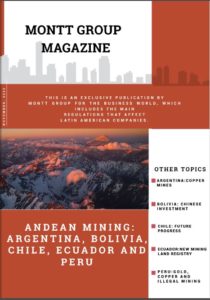
Montt Group Legal Bulletin
Central Andean Mining Breaking News
Chile: New Framework Law on Sectoral Authorizations (Law No. 21,770)
Publication Date: September 29, 2025
Executive Summary
On September 29, 2025, Law No. 21,770 – Framework Law on Sectoral Authorizations was published in the Official Gazette of Chile. This new regulation modernizes the management of permits by creating a simplified, coordinated system that provides greater legal certainty and efficiency for investment projects.
The law seeks to reduce processing times, promote transparency, and encourage investment through new digital tools, alternative enabling techniques, and regulatory stability mechanisms.
Publication of the Framework Law on Sectoral Authorizations
On September 29, 2025, Law No. 21,770, which Establishes a Framework Law on Sectoral Authorizations, was published in the Official Gazette. This new statute seeks to organize and streamline the procedure for obtaining permits in Chile, providing greater legal certainty and reducing processing times for investment projects.
The law’s main purpose is to modernize the management of permits, fostering productivity and investment through a simplified and coordinated regulation among different State agencies. The following are the most relevant aspects of this new legislation:
1. New Institutional Framework for Permit Management
The law creates a System for Sectoral Regulation and Evaluation, which establishes a set of policies, institutions, and rules aimed at ensuring the proper processing of sectoral and alternative enabling technical authorizations. Within this system, two new entities are created:
- Office for Sectoral Authorizations and Investment: A functionally decentralized body, under the Subsecretariat of Economy. Its role is to oversee the system’s proper functioning, monitor procedures, coordinate sectoral agencies, and administer the new digital platform, among other powers.
- Committee on Sectoral Authorizations and Investment: Composed of the Undersecretaries of Economy (who chairs it), Finance, and Interior. Its purpose is to define specific actions to improve authorization procedures and strengthen the management of sectoral agencies.
2. Digital Platform
The law establishes the Unified Information System for Sectoral Permits, a digital platform that will serve as the sole channel for filing sectoral authorization applications. This platform will allow centralized management of all permits under this law, ensuring transparency regarding processing status, deadlines, and applicable requirements.
3. Streamlining of Procedures
For projects or activities deemed lower risk, the law introduces alternative enabling techniques to traditional authorization. These do not require a prior favorable administrative act, thus significantly expediting the enabling process. The two main mechanisms are:
- Notice (Aviso): A formal communication to the competent authority regarding the commencement of a regulated activity.
- Sworn Statement (Declaración Jurada): A document whereby the applicant declares, under his/her responsibility, compliance with all applicable sectoral regulations.
Both instruments enable the project’s development as of the day following their submission on the digital platform, without prejudice to subsequent inspection.
4. Maximum Deadlines and Administrative Silence
The law sets mandatory maximum deadlines for the administration to decide on applications, which vary depending on the type of authorization:
- Management or disposal authorizations: 120 days.
- Location authorizations: 50 days.
- Professional or service authorizations: 60 days.
- Project authorizations: 50 days.
- Operating authorizations: 25 days.
- Other authorizations (administrative acts enabling the development or execution of a project or activity not falling into the categories above): 60 days.
If the authority fails to issue a decision within the legal deadline, the applicant may invoke administrative silence, whose effect (positive or negative) depends on the type of authorization:
a) For project, operating, and “other” authorizations, if the sectoral body fails to respond in time, the authorization will be deemed granted.
b) For management/disposal, location, and professional/service authorizations, if no response is issued, the authorization will be deemed denied.
5. Investment Promotion Mechanisms
The law introduces two key mechanisms to boost investment:
- Expedited Processing of Strategic Investment Initiatives: Projects classified as strategic (based on criteria such as investment amount, impact on employment, and regional development) may benefit from reduced maximum processing times—up to half the standard deadlines.
- Regulatory Stability Regime: For projects with a favorable Environmental Qualification Resolution (RCA), sectoral authorizations will be governed by the regulations in force at the time the project was submitted to the Environmental Impact Assessment System. This shields the investment from subsequent regulatory changes, for a maximum term of eight years.
Finally, Law No. 21,770 introduces significant amendments to various laws and statutes to align their procedures with this new framework, including the Health Code, Law No. 21,075 on Greywater Reuse, Organic Law of the Ministry of Public Works, Law creating the Superintendence of Sanitary Services, Water Code, General Law on Urbanism and Constructions, Law No. 20,551 on Closure of Mining Sites and Facilities, among others.





